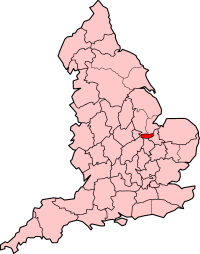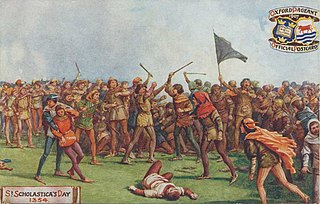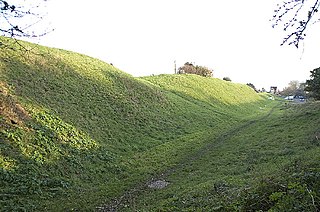Related Research Articles

Cambridge is a university city and the county town of Cambridgeshire, England, on the River Cam approximately 55 miles (89 km) north of London. At the United Kingdom Census 2011, the population of the Cambridge built-up area was 158,434 including 29,327 students. Cambridge became an important trading centre during the Roman and Viking ages, and there is archaeological evidence of settlement in the area as early as the Bronze Age. The first town charters were granted in the 12th century, although modern city status was not officially conferred until 1951.

A justice of the peace (JP) is a judicial officer of a lower or puisne court, elected or appointed by means of a commission to keep the peace. In past centuries the term commissioner of the peace was often used with the same meaning. Depending on the jurisdiction, such justices dispense summary justice or merely deal with local administrative applications in common law jurisdictions. Justices of the peace are appointed or elected from the citizens of the jurisdiction in which they serve, and are usually not required to have any formal legal education in order to qualify for the office. Some jurisdictions have varying forms of training for JPs.

The Soke of Peterborough is a historic area of England associated with the City and Diocese of Peterborough, but considered part of Northamptonshire. The Soke was also described as the Liberty of Peterborough, or Nassaburgh hundred, and comprised, besides Peterborough, about thirty parishes.

Douglas is the capital and largest town of the Isle of Man, with a population of 27,938 (2011). It is located at the mouth of the River Douglas, and on a sweeping bay of two miles. The River Douglas forms part of the town's harbour and main commercial port.

A burgh is an autonomous municipal corporation in Scotland and Northern England, usually a city, town, or toun in Scots. This type of administrative division existed from the 12th century, when King David I created the first royal burghs. Burgh status was broadly analogous to borough status, found in the rest of the United Kingdom. Following local government reorganisation in 1975, the title of "royal burgh" remains in use in many towns, but now has little more than ceremonial value.

The stone or stone weight is an English and imperial unit of mass equal to 14 pounds. The stone continues in customary use in the United Kingdom and Ireland for body weight.
In finance, a surety, surety bond or guaranty involves a promise by one party to assume responsibility for the debt obligation of a borrower if that borrower defaults. Usually, a surety bond or surety is a promise by a surety or guarantor to pay one party a certain amount if a second party fails to meet some obligation, such as fulfilling the terms of a contract. The surety bond protects the obligee against losses resulting from the principal's failure to meet the obligation. The person or company providing the promise is also known as a "surety" or as a "guarantor".

Cambridgeshire Constabulary is the local territorial police force that covers the territory of the counties of Cambridgeshire and Peterborough. It provides law enforcement and security for an area of just under 3400 km² and population of nearly a million people in a predominantly rural county. The force of Cambridgeshire includes the cities of Cambridge, Ely and Peterborough, the market towns of St Ives, Huntingdon and St Neots, and the historic Fenland towns of Ramsey, Chatteris, Wisbech, Whittlesey and March. The constabulary's logo is a crowned Brunswick star with two wavy blue lines representing the two major rivers that flow the area, the Cam and the Nene.

Town and gown are two distinct communities of a university town; 'town' being the non-academic population and 'gown' metonymically being the university community, especially in ancient seats of learning such as Oxford, Cambridge, Durham, and St Andrews, although the term is also used to describe modern university towns as well as towns with a significant public school. The metaphor is historical in its connotation but continues to be used in the literature on urban higher education and in common parlance.
A recorder is a judicial officer in England and Wales and some other common law jurisdictions.

The St Scholastica Day riot took place in Oxford, England, on 10 February 1355, Saint Scholastica's Day. The disturbance began when two students from the University of Oxford complained about the quality of wine served to them in the Swindlestock Tavern, which was based at Carfax, in the centre of the town. The students quarrelled with the taverner; the argument quickly escalated to blows. The inn's customers joined in on both sides, and the resulting mêlée turned into a riot. The violence started by the bar brawl continued over three days, with armed gangs coming in from the countryside to assist the townspeople. University halls and students' accommodation were raided and the inhabitants murdered; there were some reports of clerics being scalped. Around 30 townsfolk were killed, as were up to 63 members of the university.

The Municipal Corporations Act 1835, sometimes known as the Municipal Reform Act, was an Act of the Parliament of the United Kingdom that reformed local government in the incorporated boroughs of England and Wales. The legislation was part of the reform programme of the Whigs and followed the Reform Act 1832, which had abolished most of the rotten boroughs for parliamentary purposes.

The County Court of Victoria is the intermediate court in the Australian state of Victoria. It is equivalent to district courts in the other states.

The ancient boroughs were a historic unit of lower-tier local government in England and Wales. The ancient boroughs covered only important towns and were established by charters granted at different times by the monarchy. Their history is largely concerned with the origin of such towns and how they gained the right of self-government. Ancient boroughs were reformed by the Municipal Corporations Act 1835, which introduced directly elected corporations and allowed the incorporation of new industrial towns. Municipal boroughs ceased to be used for the purposes of local government in 1974, with borough status retained as an honorific title granted by the Crown.
Boston was a parliamentary borough in Lincolnshire, which elected two Members of Parliament (MPs) to the House of Commons from 1547 until 1885, and then one member from 1885 until 1918, when the constituency was abolished.
The Royal Commission on the Corporation of the City of London was a Royal Commission, established in 1853, which considered the local government arrangements of the City of London and the surrounding metropolitan area.

Cambridge Guildhall is a civic building in the centre of the historic city of Cambridge, England. It includes two halls, The Large Hall and The Small Hall, and is used for many disparate events such as comedy acts, conferences, craft fairs, live music, talks, and weddings. It is also used by the University of Cambridge for certain examinations. It is owned and managed by the Cambridge City Council, and it is their seat of government. The Guildhall is located on the south side of Market Hill, the market square in Cambridge, between Peas Hill to the west and Guildhall Street to the east. It is a Grade II listed building.
A clerk is a senior official of many municipal governments in the English-speaking world. In some communities, including most in the United States, the position is elected, but in many others, the clerk is appointed to their post. In almost all cases, the actual title of the clerk reflects the type of municipality he or she works for, thus, instead of simply being known as the clerk, the position is generally referred to as the town clerk, township clerk, city clerk, village clerk, borough clerk, board secretary, or county clerk. Other titles also exist, such as recorder. The office has existed for centuries, though in some places it is now being merged with other positions.
Charlotte Manning was a British feminist, scholar and writer. She was the first head of Girton College.
William Samuel Powell, D.D. was an eighteenth century academic and priest, most notably Vice Chancellor of the University of Cambridge from 1765 until 1766; and Archdeacon of Colchester from 1766 until his death.
References
- ↑ "Votes for Proctors, Taxors and Scrutators (1684–1861)". Cambridge University Archives. Retrieved 2009-03-22.
- ↑ "Records of and relating to Taxors (1607–1856)". Cambridge University Archives. Retrieved 2009-03-22.
- ↑ J. P. C. Roach, ed. (1959). "The archives of the University of Cambridge". A History of the County of Cambridge and the Isle of Ely. 3. pp. 327–329. Retrieved 2009-03-21.
- ↑ J. P. C. Roach, ed. (1959). "Town and gown". A History of the County of Cambridge and the Isle of Ely. 3. p. 83 (Trade). Retrieved 2009-03-21.
- 1 2 D. A. Winstanley (1977). Early Victorian Cambridge. Ayer Publishing. p. 128. ISBN 978-0-10-510024-9 . Retrieved 2009-03-31.
- ↑ J. P. C. Roach, ed. (1959). "Town and gown". A History of the County of Cambridge and the Isle of Ely. 3. p. 84 (Finance). Retrieved 2009-03-21.
- ↑ D. A. Winstanley (1977). "Chapter VIII". Early Victorian Cambridge. Ayer Publishing. pp. 132–138. ISBN 978-0-10-510024-9 . Retrieved 2009-03-22.